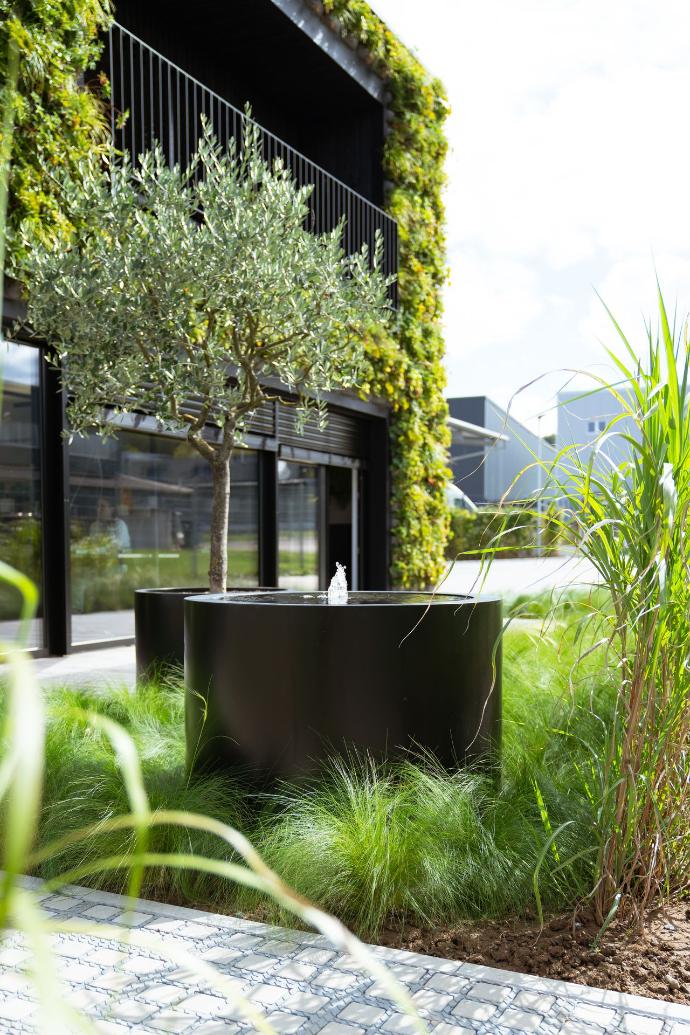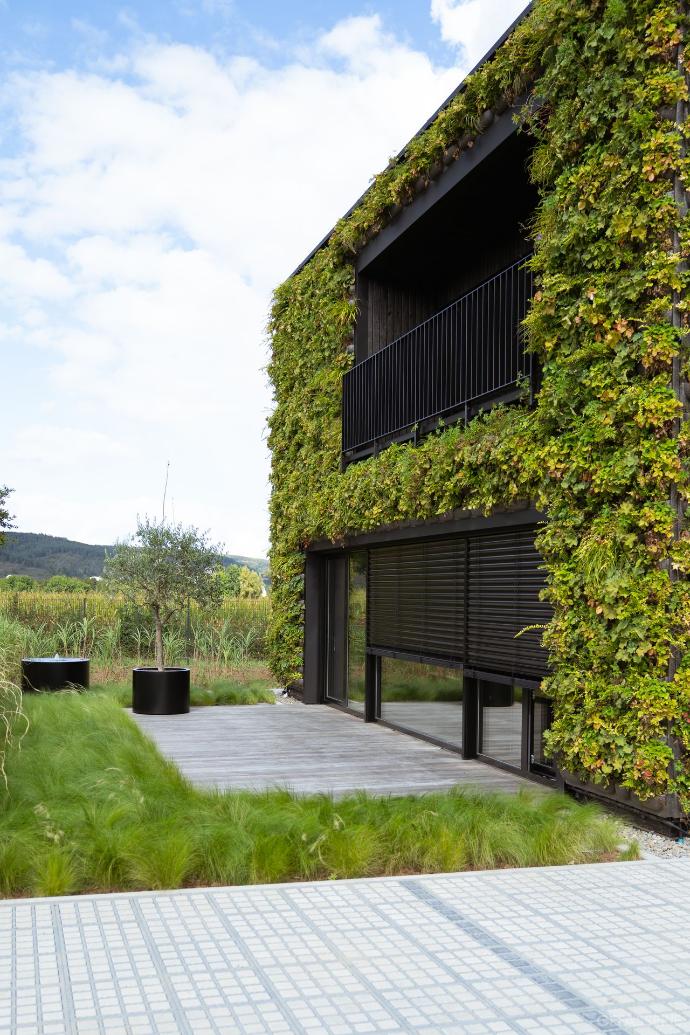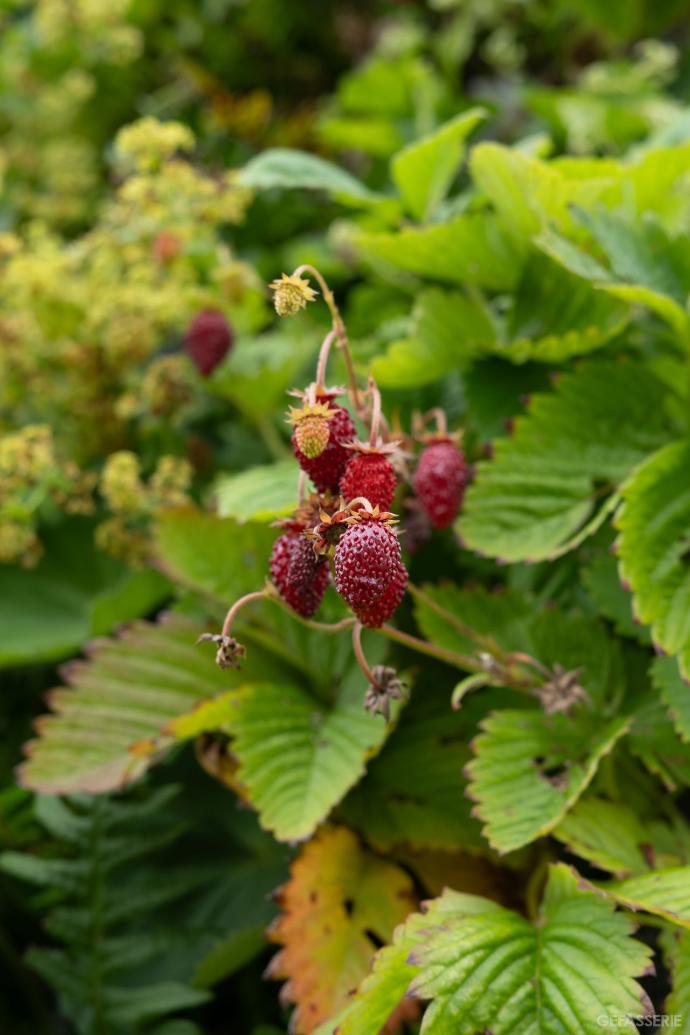The German company GEFÄSSERIE – Die Wandbegrüner was recognized as one of the first GBI Leaders as part of the IB-Green Award. IB-Green talked to Achim Eilingsfeld and Heike Schneider from GEFÄSSERIE about their area of expertise: green façades and why these are more than worth the time and money spent for companies. Another focus of this interview was what support from municipalities would be helpful to make it easier for companies to plan and implement greening measures.
Photos © Flow Ryan Photography
Find more about the implemented measures for which GEFÄSSERIE - Die Wandbegrüner received the IB-Green Award here.
Achim Eilingsfeld/Heike Schneider, GEFÄSSERIE - Die Wandbegrüner: We are
especially proud of the diverse greening measures we’ve implemented in, on, and
around our company building in Fuchsstadt. A true highlight is our green showroom: the entire green façade is
based on a modular system that is supplied with rainwater from a 30,000-liter
cistern. This allows for sustainable plant irrigation without using drinking water.
The concept is complemented by an extensive green roof with a structural height
of 15 cm, planted with resilient sedum and herb mixtures. This type of roof can
store up to 20 liters of rainwater per square meter—a valuable contribution to
stormwater management, especially in commercial environments.
Other key measures include the use of unsealed surfaces in our courtyard and
parking areas, our own photovoltaic system, and the sustainable wood stand
construction of our company building.
The positive effects of all these measures are clearly noticeable: we see both ecological and visual enhancements of the building, a noticeable improvement in indoor and outdoor climate, and a contribution to rainwater retention. The durability of the roof sealing also benefits, and last but not least, the green design has turned our premises into a true showcase for clients and guests.
Achim Eilingsfeld/Heike Schneider, GEFÄSSERIE - Die Wandbegrüner: Our
goal remains to further develop the GEFÄSSERIE site as a living example of a
climate-adapted and nature-oriented corporate architecture. Measures to promote
biodiversity, such as insect habitats or blooming zones, are on our agenda.
Achim Eilingsfeld/Heike Schneider, GEFÄSSERIE - Die Wandbegrüner:
We
received some support, mainly in the form of consultation and informational
materials, for which we are grateful. However, we would have welcomed stronger
support- especially in the form of financial subsidies and simplified approval
procedures for green infrastructure. This kind of simplification could motivate
more companies to adopt similar measures. For instance, a certification of
green façades could significantly speed up permits and provide planning security.
Achim Eilingsfeld/Heike Schneider, GEFÄSSERIE - Die Wandbegrüner: One
of the biggest challenges was selecting suitable plant species for each
building depending on the compass direction. Every side of a façade poses
different demands: while the south-facing side can handle a lot of sun, shaded
north-facing areas are a completely different challenge. We also wanted to
create a harmonious, aesthetically pleasing overall appearance. With the right
selection, both ecological and design goals can be achieved.
Achim Eilingsfeld/Heike Schneider, GEFÄSSERIE - Die Wandbegrüner: Our
most important advice: just get started – even on a small scale. Whether it’s a
greened carport roof or a planted hedge—every square meter counts. It’s crucial
to involve experts early in the planning process for green façades, especially
for new buildings, to develop meaningful and long-term solutions.
Implementation should be holistic: rainwater use, site-appropriate planting,
and good coordination between planning, implementation and maintenance are key.
Achim Eilingsfeld/Heike Schneider, GEFÄSSERIE - Die Wandbegrüner: The
maintenance of our green spaces is pleasantly manageable. For the façade,
usually one to two pruning sessions per year are sufficient, depending on plant
selection, orientation and growth. In between, basic monitoring and visual
checks are enough. Our green roofs are designed as extensive systems, making
them especially low-maintenance: one to two inspections and targeted
fertilization per year are sufficient.
Achim Eilingsfeld/Heike Schneider, GEFÄSSERIE - Die Wandbegrüner: Our
employees feel very comfortable in the green environment. Working in a greened
building—without air conditioning—is pleasant, and we’ve noticed a low rate of
sick days. The opportunity to snack on fresh alpine strawberries straight from
the façade during breaks is very popular. And yes, some team members have been
inspired: we’ve received concrete feedback about new planting ideas for
balconies and gardens—one employee is even considering greening her entire new
home. It’s great to see how workplace greening also boosts environmental
awareness in private life.
Achim Eilingsfeld/Heike Schneider, GEFÄSSERIE - Die Wandbegrüner: From
the beginning, our goal was to use our showroom to demonstrate what is possible
today in terms of greening—from façade solutions to biophilic interior design.
Visitors shouldn’t just gather ideas here—they should experience real impact.
We also provide data: on July 2 at 12 p.m., the temperature in front of the
greened façade was 48.1 °C—directly behind it, just 29.4 °C.
We draw inspiration from flagship projects in Germany and abroad, from
attending trade fairs and from close collaboration with planners and
architects.
Achim Eilingsfeld/Heike Schneider, GEFÄSSERIE - Die Wandbegrüner: Our
message is clear: go for it! With competent support, such measures are very
feasible—and they are worth it on many levels. The environment benefits, as
does the company climate; employees feel more comfortable, and the positive
effects are measurable. Especially in the face of climate change, green
solutions are no longer a “nice-to-have” but a vital part of corporate
responsibility. And last but certainly not least: it simply looks great.


